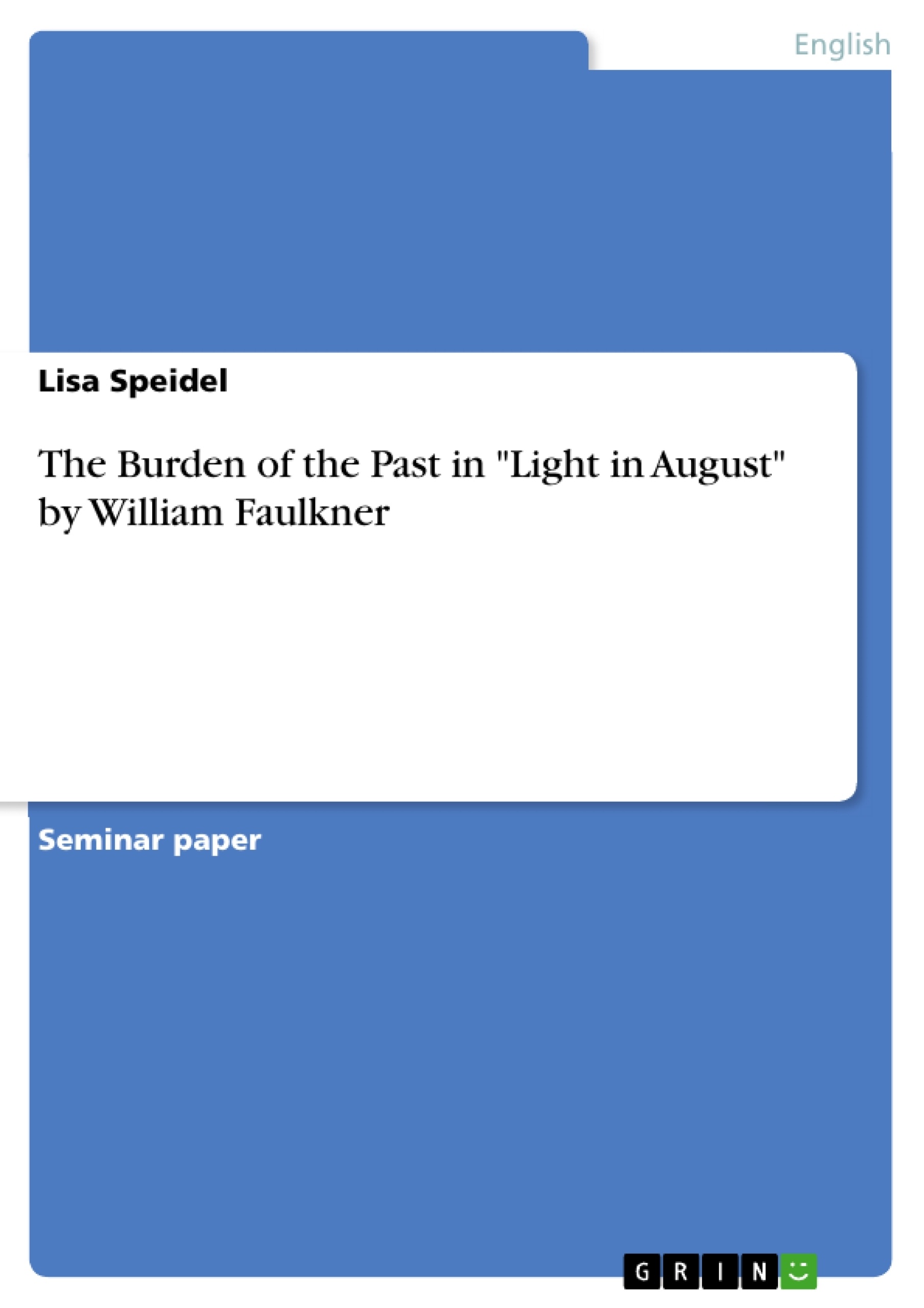As almost in all of William Faulkner’s novels in “Light in August” the past determines the present like nothing else in the whole story. Although the book is considered as primarily Christmas’ story it is noticeable that the story of Christmas life from adolescence to his present age of thirty-three just takes a few pages in the whole novel.
Therefore it is likely that another point in the novel is far more important than simply the story of Christmas’ life: the past that determines the present and burdens its owners. The novel also explores issues of gender and race specifically, but these particular thematic currents intersect to become part of Faulkner’s larger inquiry concerning the nature of identity and how it is influenced by ones’ own history. The past is one of the most important facts in the whole story for half of the book is written in flashbacks, while the story itself seems to take just a small part from the whole large part.
To understand Faulkner’s characters actions in the present it is necessary to understand and know their history in the past, which determines their present greatly. Although the novel explores the issues of gender and race specifically, these particular thematic actions are part of Faulkner’s larger, more all-encompassing inquiry concerning the nature of identity and how it is influenced by a families history, the society and individual lives of the protagonists. But not only the actions of the main protagonist Joe Christmas, are caused by the events in his past. Altogether there are three of Faulkner’s protagonists in “Light in August” which are prominent examples for how the past of a person can determine their actions in the present or their whole life in general.
This three are for one Joe Christmas, whose troubled past determines his actions and his self-consciousness, Joanna Burden, who is namely affected by her ancestors religious beliefs and Gail Hightower, who is also affected by his ancestors history, but instead of Joanna not by religion, but the civil war. The townsfolk of Jefferson has resolved a acceptance of Reverend Hightower, Joanna Burden, and Joe Christmas, but each of these characters deliberately resists or abandons the distorting influence of a rigid social and moral order. They live their lives in solidarity because of the past, their ancestors left them as heritage and burden. [...]
Table of Contents
- I. Introduction
- II. Joanna Burden
- III. Joe Christmas
- IV. Reverend Gail Hightower
- V. Conclusion
Objectives and Key Themes
William Faulkner's "Light in August" explores the complex interplay between the past and the present, particularly as it shapes the lives of the characters. The novel delves into the enduring legacy of family history, societal structures, and individual experiences, examining how these elements contribute to the formation of identity. Through the lens of the protagonist, Joe Christmas, and other pivotal figures, the narrative reveals the lasting impact of past events on the present, highlighting the persistent influence of memory and its role in shaping individual choices and actions.
- The impact of the past on the present
- The role of memory in shaping identity
- The influence of societal structures and family history on individuals
- The complexities of race and gender in the American South
- The struggle for individual freedom and self-determination
Chapter Summaries
- I. Introduction: This chapter establishes the central theme of the novel, which is the influence of the past on the present. The author argues that the story of Joe Christmas, while important, is only a small part of the larger narrative about how history shapes individuals. The introduction also highlights the significance of understanding the characters' pasts to fully comprehend their actions in the present.
- II. Joanna Burden: This chapter explores the life of Joanna Burden, focusing on how her family's history has shaped her life and her beliefs. Her family's legacy, marked by a complex mix of religious convictions, racial prejudice, and societal outsider status, has created a unique set of burdens for Joanna. Her grandfather's anti-slavery activism and his tragic death, along with her father's fervent embrace of his father's beliefs, have deeply influenced Joanna's own sense of self and her place in the world.
Keywords
The novel "Light in August" revolves around themes of memory, identity, family history, societal structures, race, and gender. The narrative explores the complexities of the American South in the post-Civil War era, highlighting the lasting impact of slavery and racism on individuals and communities. Key concepts include the nature of sin and its influence on human behavior, the struggle for individual freedom, and the intersection of personal and historical narratives.
- Quote paper
- Lisa Speidel (Author), 2013, The Burden of the Past in "Light in August" by William Faulkner, Munich, GRIN Verlag, https://www.grin.com/document/377442



